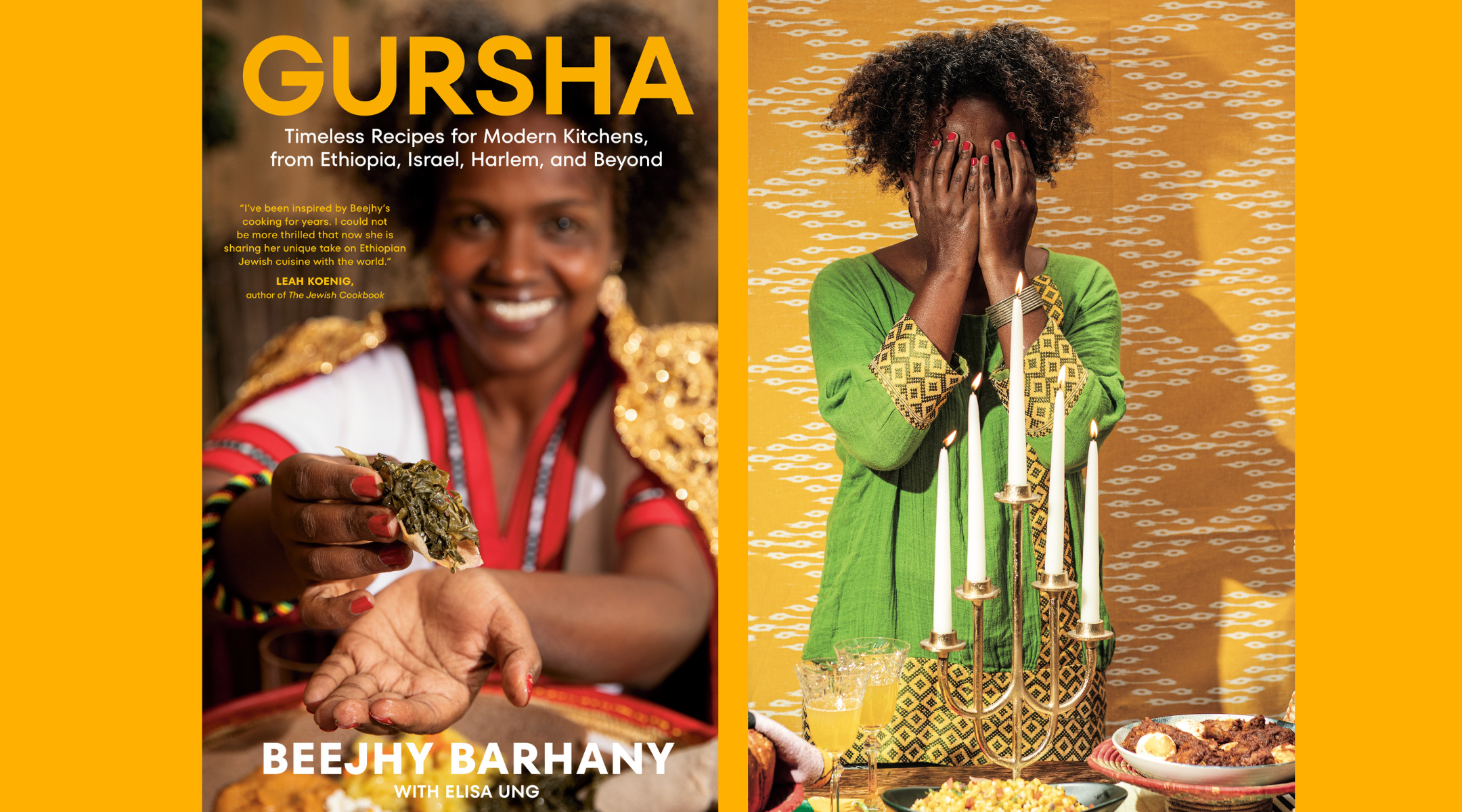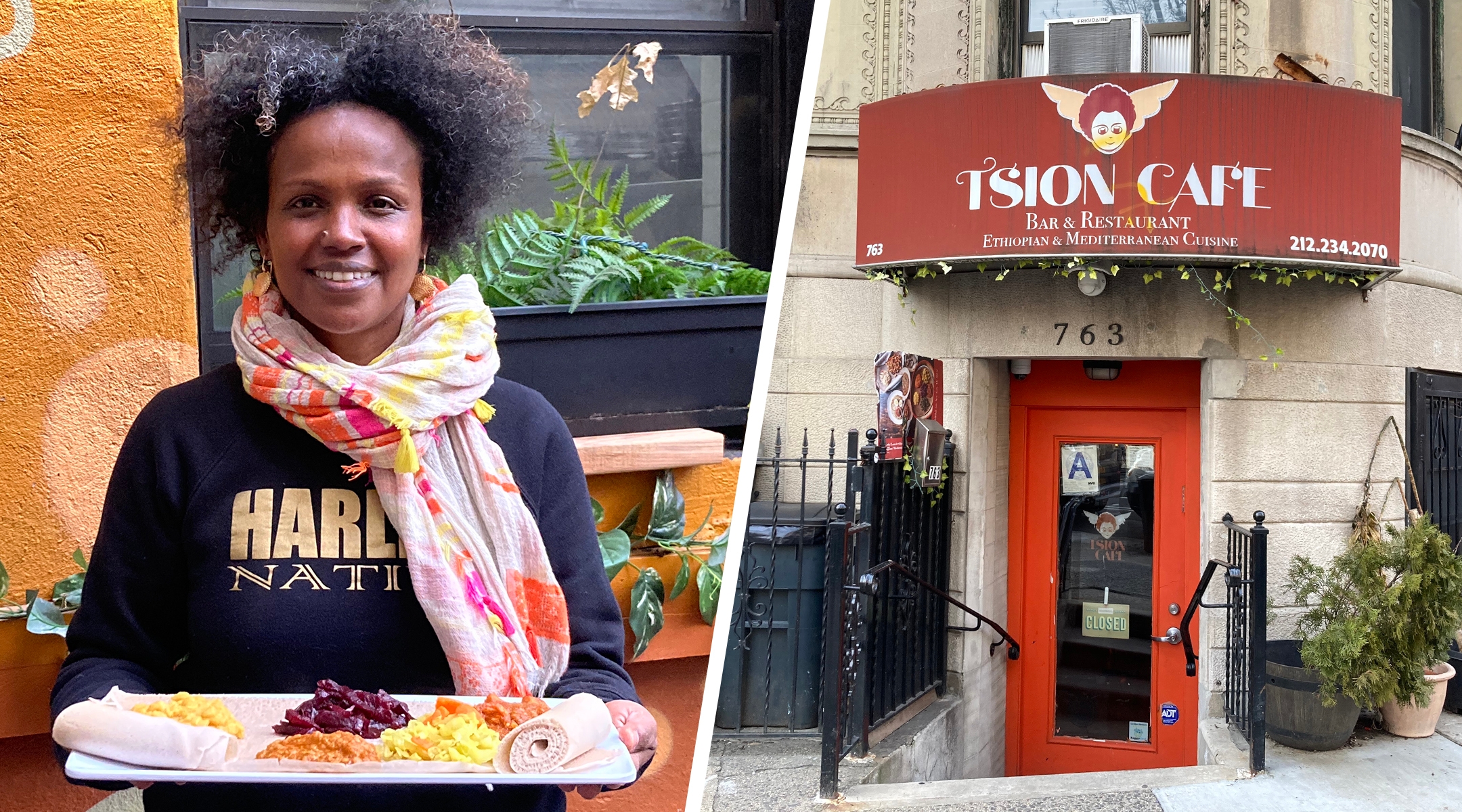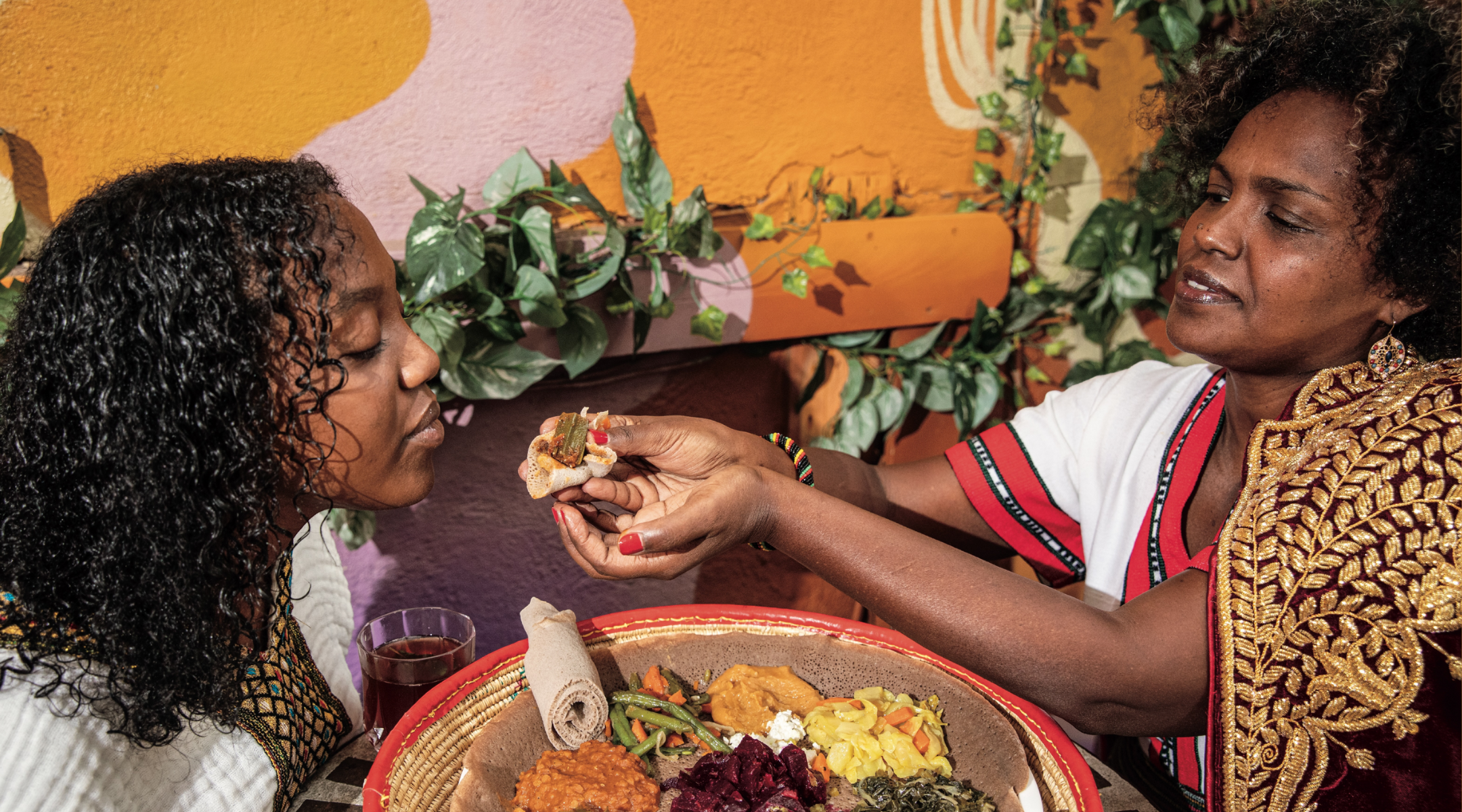Chef Beejhy Barhany, the proprietor of Tsion Cafe, a kosher and vegan Israeli-Ethiopian restaurant in Harlem, was born in Ethiopia. As a child, she spent three years in Sudan, then lived in Ashkelon in southern Israel until she moved to Kibbutz Alumim, near the Gaza Strip, during her teen years. After serving in the Israel Defense Forces, she traveled the world and, in her early 20s, settled in New York City.
Now, Barhany’s first book, “Gursha: Timeless Recipes for Modern Kitchens, from Ethiopia, Israel, Harlem, and Beyond,” reflects the breadth of her journey.
Its title, “Gursha,” is Amharic, the official language of Ethiopia. The word literally means “mouthful” and refers to the Ethiopian hospitality tradition of feeding one another morsels of food, usually by hand. More broadly, it means the act of feeding and nourishing another as a sign of affection — a major theme of the book.
The word, explains Barhany, describes “what I am trying to do to each individual who buys the book or works on a recipe,” she told the New York Jewish Week. “I am nourishing them with delicious ideas, recipes, stories and traditions.”
The book, filled with photographs and illustrations, is possibly the first Ethiopian Jewish cookbook. It features more than 100 recipes, ranging from berbere, a spice blend widely used in Ethiopian cuisine, to doro wat, a spicy chicken drumstick stew, to beg wot, a holiday lamb stew that Ethiopian Jews, also known as the Beta Israel, often eat on Passover and Rosh Hashanah. There’s also Ethiopian barbecued corn bread, a dish that combines Barhany’s Ethiopian roots and her Harlem influences.
“I wanted to bring aspects of my community into this book,” said Barhany, who was named to the Jewish Week’s 36 to Watch list last year. “Since it is the first Ethiopian Jewish cookbook, I wanted to give it an honor and have it used as a reference for people.”
In “Gursha,” Barhany — a mother of two who runs Tsion Cafe with her husband, Padmore John, who originally hails from the Caribbean island of Dominica — shares memories of her childhood in Tigray, in northern Ethiopia. There her family had sprawling fields filled with “orange pumpkins, crimson tomatoes, and delicate wild greens,” she writes. She describes how Jewish life centered around the Sabbath, what Barhany describes as “the most sacred of days.”
Barhany talks vividly about her community’s weekly anticipation for the Sabbath: “You keep your best produce, the best fish and chicken for Shabbat,” she said. “Enjoy it and celebrate it and feed one another. And share it.”

The cover of “Gursha,” left, and a photo of Barhany from inside the book. (Clay Williams, courtesy of Knopf)
Barhany is “someone who was put on this earth to nourish others,” said Jewish cookbook author and food personality Jake Cohen Describing “Gursha” as “a gorgeous look at a completely different Jewish experience,” he said the book is “something I would want on my shelf because it’s a unique story of her individual experience.”
In the book, Barhany explains in rich detail how, following the 1975 assassination of Emperor Haile Selassie, the Beta Israel suffered persecution and repression under the bloody rule of Mengistu Haile Mariam. Amid the upheaval, 4-year-old Barhany, her family and 300 members of her village secretly left their homes in 1980 to travel to Israel on foot.
Barhany’s stories and recipes shine a light on the struggles the Beta Israel faced while traversing the desert in Ethiopia, then spending three years in Sudan, before arriving in Israel in 1983. Throughout their long ordeal, Barhany describes how they never sacrificed Shabbat and other Jewish rituals.
“As observant Jews, it was important to us not to skip [Shabbat observance] even in dangerous circumstances,” she writes. “It was also comforting to know that there would be at least one day a week when we did not have to be on the move.” Baked into that memory is a recipe for kita, a simple flatbread that the women of her community would prepare over an open fire before sundown came, heralding the start of the Sabbath.
When they arrived in Israel, the Beta Israel faced new challenges. The other immigrants at their absorption center had never before seen Black Jews, and they called them names. The Beta Israel Jews engaged in a long campaign to convince the government that they were, in fact, Jewish. They were given Hebrew names in place of their Ethiopian ones. And there was limited access to the ingredients that they needed in order to prepare Ethiopian food.
For a few years, Barhany steered clear of her native cuisine. “I felt ashamed when my non-Ethiopian friends complained it was too spicy,” she writes.
Barhany moved to New York in 2000, after falling in love with the city during a post-army world tour. Here, Barhany was eager to educate others about Ethiopian Jewry, founding the nonprofit Beta Israel of North America Cultural Foundation that same year. The warm interest the group received from New York’s Jewish, Ethiopian and African-American communities eventually inspired Barhany to open Tsion Cafe on St. Nicholas Avenue in Harlem in 2014.
Last year, Barhany reimagined the restaurant’s menu, becoming certified kosher and fully vegan. She was motivated by the spike in antisemitism following Hamas’ Oct. 7, 2023 attack on Israel. “I am proud of my identity, being a Black Jewish woman here in the U.S., in Harlem, and I felt like, you know, what is better to illuminate, to shine and showcase who I am — no matter what, even though the hatred towards us has increased — and become fully kosher,” she told the New York Jewish Week at the time.

Beejhy Barhany shows off the vegan dishes at her recently kosher-certified Ethiopian-Israeli Harlem restaurant, Tsion Cafe, last year. (Lisa Keys)
Barhany said she began thinking about writing a book after she first opened Tsion Cafe. In 2020, however, several forces came together — including the COVID-19 pandemic and the Black Lives Matter movement — to push her to submit her book proposal to publishers.
“I said to myself that it is about time to compile all of the traditional stories and recipes of my community and bring them to the masses around the world,” Barhany said.
Tom Pold, senior editor at Knopf Cooks, had been looking for an Ethiopian cookbook “for years,” he wrote in an email. “Then Beejhy’s proposal came in, and her beautiful interweaving of the recipes she grew up cooking and eating with the story of her Jewish community — and of her own life — completely won me over.”
Several years in the making, Barhany said that it was intentional that “Gursha” hit shelves just before Passover.
“I wanted to connect the story of the Exodus of the Israelites from Egypt to my community,” she said. “The resilience of the Israelites, the Hebews, is very much like the resilience of my community. Emigrating to the Promised Land. Yearning. Lots of similarities there.”
The New York Jewish Week brings you the stories behind the headlines, keeping you connected to Jewish life in New York. Help sustain the reporting you trust by donating today.





